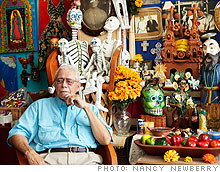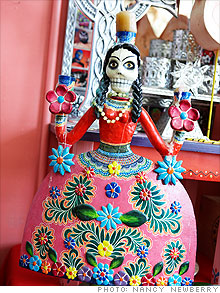An art shop bridging borders
A Houston entrepreneur looks to his Mexican roots to build his business.
 |
| Macario Ramirez, sitting in his shop, Casa Ramirez |
 |
| A Day of the Dead doll |
(Fortune Small Business) -- As you walk into Casa Ramirez, a Mexican folk art store in Houston's Heights neighborhood, you'll need a moment to recover from the sensory overload.
The walls are covered with paintings and colorful Day of the Dead dolls. The bookshelves are jammed with tomes on Latino art, culture and history. Pi�atas dangle from the ceiling. And colorful blouses imported from Chiapas, Mexico hang on crowded racks. Throughout the shop, the flames of votive candles flicker at little makeshift altars.
Macario Ramirez and his wife, Chrissie, opened the store in 1984. They don't just peddle their native wares; they also offer lectures on Mexican culture and traditions by Ramirez and visiting artists and authors, many of whom live in town. "Houston is a microcosm of Latino cultures," says Ramirez, 74.
His devotion to Mexican traditions, such as the Day of the Dead festivities -- in which ancestors are honored and remembered each November -- provides an economic boost to local artists, including painter Laura L�pez Cano. As a fine artist with numerous national exhibitions on her r�sum�, Cano, 50, was initially unsure that a folk art store was the best setting for her paintings. But after a few visits she changed her mind.
"Just stand around and see how many people walk into the store," she says. "I don't think I've ever seen anyone leave without buying something." Sure enough, her first two pieces sold in a week. "Macario really sells without trying to sell," Cano says. "He's more like a proud father bragging about a child who became a doctor."
In addition to serving as his artists' biggest booster, Ramirez is a self-described "hands-on activist." He financially supports alternative education programs that benefit Latinos, pickets oil companies accused of polluting Houston's East End (an area with a sizable Latino population) and demonstrates on behalf of undocumented immigrants. "I never forgot being poor," says Ramirez, who speaks with a Tejano accent and peppers his sentences with Spanish words and phrases.
One of six children born in San Antonio to Mexican immigrants, Ramirez graduated from St. Mary's University in San Antonio in 1967. Within a few years he was working in Washington, D.C. on a government project researching the working conditions of Latino laborers.
"I had to make an impact in my community," he says. "I wasn't thinking about entrepreneurship back then."
His thinking didn't change until his beloved father, Jesus Ramirez, who ran a similar but much smaller shop in San Antonio, died in 1984. "I needed to do something for that wonderful man who worked his butt off for all of us," he says.
Now, 25 years after opening their store, Ramirez and his wife still visit Mexico three or four times a year to buy pieces directly from artists in cities such as Oaxaca and Puebla. Their sales have been stable despite the Great Recession, which is good news for the beneficiaries of his activism and educational efforts. In the end, Ramirez says, "the business supports the teaching and good works." ![]()
-
The Cheesecake Factory created smaller portions to survive the downturn. Play
-
A breeder of award-winning marijuana seeds is following the money and heading to the U.S. More
-
Most small businesses die within five years, but Amish businesses have a survival rate north of 90%. More
-
The 10 most popular franchise brands over the past decade -- and their failure rates. More
-
These firms are the last left in America making iconic products now in their twilight. More









